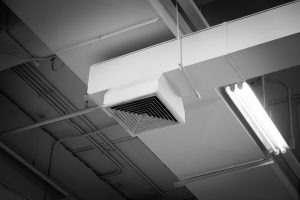Maintaining Your Home Air Quality Through the Hot Summer Months
The EPA reports that the average American spends about 90 percent of his or her time indoors. In addition, indoor air quality is among the top five environmental risks to health — it can be up to five times more polluted than outdoor air. Summer heat and humidity can negatively impact indoor air quality, too. It sounds a bit frightening, but worry not. Here’s how to keep your home’s indoor air safe this summer as you beat Tampa’s heat in the cool A/C.
Air Filtration
Volatile organic compounds (VOCs) are airborne chemicals that can be hazardous to your health and the environment. They’re year-round concerns, but even more so in the summer when the heat disperses them widely. VOCs are emitted as gases from certain solids/liquids, and levels can be up to 10 times higher indoors that outside — many household items emit VOCs. VOCs can also get into your living space through open windows or ventilation systems. In the summer, the main culprits are:
- Pesticides
- Fertilizers
- Insect repellants
- Gas mower exhaust
The list of health impacts is long, from headaches to cancer. To reduce the impact of VOCs, you need a proper indoor air filtration system. Whole-house air filters clarify air through your home’s HVAC system. The type of air filter matters; look for a MERV rating (which indicates overall effectiveness at trapping particles) of 16 or higher to remove chemicals from the air.
Ventilation
The longer air remains in a home, the longer the pollutants also stay. The air exchange rate (ACH) is the number of times outdoor air replaces indoor air per hour. It can tell you how well your home is ventilated; the lower the ACH, the lower the indoor air quality typically is.
To improve your home’s ACH, improve ventilation. Simply opening a window won’t get you the ventilation needed, especially in summer; you’ll need a mechanical ventilation system that circulates fresh air using ducts and fans. Ventilation systems can improve air quality and your comfort. Balanced-type systems reduce the moisture content of incoming air, and supply-type systems both cool and dehumidify outdoor air before it enters your home.
Dehumidifiers
In summer, the relative humidity in your home can rise. This creates condensation on air-conditioned surfaces and dampness in attics as warm air rises and cooler air sinks. High levels of relative humidity can cause health problems, discomfort and a less-hygienic atmosphere.
An indoor relative humidity level of 60 percent or more can also lead to problems like mildew and mold. Ideal indoor relative humidity levels should remain between 20 and 60 percent.
Using a dehumidifier will not only remove humidity, but it’ll also keep your home at a more comfortable temperature — particularly in the summer.
Are you ready for summer’s heat? The professionals at Cox Heating and Air Conditioning have the latest technology for indoor air filtration and can help ensure your Tampa-area home stays comfortable. Contact the HVAC experts at Cox today.
How to Win the War of the Thermostat at Home
As Tampa temperatures rise, keeping your home cool and comfortable becomes increasingly important. But climate control at home isn’t always easy, especially if you live with family members who have differing air-temperature preferences. If setting the thermostat for your air conditioning leaves you feeling battle-weary, these tips for winning the war over the thermostat will help.
 Go Green
Go Green
Save some green while keeping your home cool, dehumidified and at a moderate temperature that even family members who mind the cold can withstand. The U.S. Department of Energy recommends setting your air conditioning to 78 degrees Fahrenheit while you’re home and to higher temperatures while you’re away for maximum energy efficiency. Programmable thermostats make it easier than ever to operate HVAC systems efficiently, and you can set them to adjust the temperature before you come home so your air conditioning feels comfortable when you arrive.
Use Fans Strategically
Using ceiling fans lets you raise your HVAC system’s thermostat setting by approximately 4 degrees without sacrificing comfort. This is particularly important when you live in a home with family members who have varying air conditioning preferences. You can keep the thermostat set at 78F to keep everybody happy, and anyone who likes things cooler should have a ceiling fan. The wind chill effect fans provide minimizes the need to crank the air conditioning up.
Layer Up
Some people naturally mind the chill of the A/C, while others find temperatures above 75F too warm. How do you win? Everyone can dress appropriately for his or her comfort. Wearing lighter clothing helps keep people who mind the heat cooler, while anyone who’s always cold should consider wearing light layers to keep warm without heating up everyone else in the house.
Chill Out
Do you mind the heat? There are ways to keep cool without changing your air conditioning settings. Examples include:
- Filling a bowl with ice or ice packs and positioning it in front of a large fan for chilled comfort
- Switching to light, breathable cotton sheets
- Swapping your pillow for one filled with buckwheat hulls, which don’t retain body heat like traditional pillow fillings do
- Turning on exhaust fans to pull hot air out of the house after showering or cooking
Warm Up
Likewise, if you find yourself always feeling chilly, you can warm up your personal space without touching the thermostat. Examples include:
- Keeping the door to your room closed to prevent the bulk of the air conditioning from flowing in
- Sticking with warmer bedding like flannel sheets and a cozy quilt
- Opening your window at night to let the ambient temperature in — just be sure to keep your door shut and close the window before the hottest morning hours
No matter how you prefer to set your air conditioning temperatures, keeping HVAC systems in tip-top shape improves your unit’s efficiency and extends its life. Visit Cox Heating & Air Conditioning to learn more or to schedule an appointment today.
Beat the Heat and Humidity: Floridians Take On Air Conditioning
For Floridians, air conditioning isn’t a luxury — it’s as necessary as oxygen! Soaring humidity levels and scorching summer temperatures keep many Floridians indoors to avoid the worst of the swampy weather. Average temperatures in the Sunshine State range from 64 to 74 degrees Fahrenheit during winter and 80 F to 92 F during summer, with humidity levels averaging 73 to 90 percent. Let’s face it. With that weather, air conditioning is like another family member — it’s vital to everyday life. Other than keeping HVAC systems in tip-top shape, how do Floridians beat the heat? With some summer survival tips, of course!
 Survival Tips
Survival Tips
No matter how amazing your air conditioning is, you eventually have to venture outside. When you do:
1. Stay Hydrated
If you’re undergoing HVAC installation or repairs or you simply plan to spend time outside, the number-one way to survive Florida’s climate is to drink plenty of water. While your spirit might want to head to Margaritaville, your body needs to replenish electrolytes, which you lose while you’re sweating under the hot Florida sun.
2. Consider Your Timing
When you want to go for a walk, run or do anything strenuous outside, time it for early morning or evening. Otherwise, once the high heat kicks in, you’ll feel like you’re broiling.
3. Wear Cooling Clothing
Stick with breathable fabrics that won’t cling to your body. Light colors help you feel cooler, moisture-wicking materials can help keep you dry and sunglasses shield your eyes from the glare of the sizzling sun. Don’t forget sunscreen!
Maintaining HVAC Systems
Before HVAC installation was possible, not many people lived in Florida. Without air conditioning, not many folks would stick around for the summer even today! Fortunately, HVAC systems are widely available now. With a little maintenance, you can chill out for many seasons to come.
1. Clean and Replace Filters Regularly
Prevent HVAC systems from becoming overworked — which could put your system at risk for a dreaded breakdown — by showing some love to your HVAC system’s filters. Dirty, clogged filters not only make HVAC systems work harder, but they also reduce airflow. That means you won’t be as cool as you want to be.
2. Free Up the Compressors
To stay cool, you need to make sure your unit’s outdoor compressor stays free of all shrubs, plants and other debris. Thoroughly check and remove foliage in spring and fall.
3. Have a Reputable Service Company on Speed Dial
HVAC installation, repairs, tune-ups — service companies can do it all. Living in Florida, you already know how important it is to have a reliable company on call if your air stops working or you need professional maintenance to keep the cool air flowing.
Cox Heating & Air Conditioning has been providing expert professional services to Hillsborough and Pinellas counties since 1958. If you have questions or need help beating the heat, visit our website to learn more or schedule an appointment today.
Entertaining Indoors and Out with Central Air Conditioning
Whether you’re planning some fun in the sun or a night under the stars, summer’s heat adds a challenging element to entertaining. You want your guests to be comfortable, but you don’t want to send your central air conditioning into overdrive — or your utility bills soaring. To keep your summer parties going strong without busting your budget, we rounded up some of our coolest entertaining tips that beat the heat without leaving your guests sweating it out.
Location, Location, Location
When your AC service Tampa team is installing your HVAC system, have them place the central air conditioning’s outdoor unit away from your outdoor entertaining space. Otherwise, every time you have friends or family over, you’ll deal with some noise while the unit is on and notice the bulky appearance of the condenser unit. Instead, ask your AC service Tampa team to place the unit away from your entertaining area in a shaded spot to keep the unit cooler so it doesn’t work as hard to chill your home.
Don’t Leave Doors Open
During an outdoor party, it may be tempting to prop the door open to make it easier to carry things in and out, or even to let a little cool air out to the entertaining space. This choice undermines your central air conditioning’s ability to operate efficiently. It can also result in your unit having to work harder to remove humidity from the air, which could leave it vulnerable to unnecessary stress or breakage.
Keep the House Cooler Without Cranking the A/C
In addition to keeping your windows and doors closed, there are two main ways to keep your home cooler: do your cooking outside, and avoid baking during the heat of the day. Grilling is perfect for summer entertaining, so plan to cook outside instead. Use a slow cooker to keep party foods warm or cook main dishes and sides at low temperatures without heating up the kitchen. Likewise, baking raises the temperature of your home. If you want to bake something special, try to get it in and out of the oven at night or in the early part of the morning when temperatures are cooler.
Keep Guests Cool and Comfortable
Does the summer heat send you running to the thermostat to crank up the A/C? You don’t have to change your normal settings for your central air conditioning just for entertaining. Instead, create a cooling environment for your guests with plenty of ice-cold drinks, handheld fans and spray mist bottles to help them beat the summer heat while having fun.
Before you schedule your summer entertaining, show some love to your central air conditioning system with assistance from your local AC service Tampa team. From helping you find your perfect temperature to installing new units or repairing your existing one, Cox Heating & Air Conditioning has your central AC needs covered. Call us today to schedule a tune-up, or visit our website to learn more.
Tips for Getting HVAC Systems Ready to Beat Summer Heat
Memorial Day is the official kick-off for summer and the perfect time for HVAC installation or an upgrade. It’s also a prime time to schedule a tune-up on your existing HVAC system to keep everything running smoothly for the season ahead. Whether you’re planning a laid-back gathering or an epic barbecue bash, make sure your guests are cool and comfortable while they’re inside with our tips on getting HVAC systems ready for a warm Florida summer.
Replace the Filters
Before you start using your HVAC system, replace the filters. Then, make sure you clean or replace them monthly during air-conditioning season. Dirty filters typically cause a unit to work too hard, freeze up and break down. Keeping your filters clean and replacing them regularly lets air flow more freely — your HVAC system will work better and can even remove more pollutants from the air.
Inspect the Inside Equipment
Take a quick look at the ductwork, vents, thermostats and drain lines. It’s better to see if you need repairs before the summer heat hits.
- Ductwork: This is particularly important if your HVAC installation was completed several years ago, but it’s a good idea to get into the routine of checking your ductwork every year no matter how old your system is. Worn-out ductwork can leave HVAC systems vulnerable to inefficient cooling. Check for any loose components, musty odors or spots with damaged insulation.
- Vents: Make sure the vents are free from things that might block airflow, like furniture that needs repositioning.
- Thermostats: Does your home have an outdated thermostat? Upgrading to modern, programmable thermostats can help you save money on energy bills. The U.S. Department of Energy recommends keeping your thermostat programmed for warmer temperatures while you’re away and cooler temperatures right before you return home to save up to 10 percent on your summer cooling bills.
- Drain Lines: Find the indoor cooling coil — there should be a drain nearby. Flush one cup of bleach down the air conditioning drain, and rinse it with a gallon of fresh water. This keeps the drain line clear for the season.
Inspect the Outdoor Equipment
Once you’re sure the indoor parts are in good shape, check the outdoor condenser unit to ensure it’s free of blockages. Examine the electrical wiring and refrigerant lines for heavy wear that might necessitate professional servicing before you turn the system on.
Test the HVAC System
Before having a houseful of people over on a hot day, it’s important to ensure HVAC systems are working well. Turn yours on for a short time to ensure it’s cooling effectively. If it isn’t working at peak performance, you have time to schedule a tune-up before the holiday.
Before you start making Memorial Day plans, see to it that your HVAC system is in tip-top shape. From simple maintenance to complete HVAC installation, Cox Heating & Air Conditioning has all your HVAC needs covered. Visit our website to learn more or schedule an appointment.
The History of Carrier Systems
It’s difficult to imagine living through Florida’s blistering summers without air conditioning. Before the widespread use of HVAC systems, people attempted creative methods to cool off in sweltering conditions, even harvesting and storing winter ice for later use. All this changed in 1902 when a young engineer named Willis Carrier invented a humidity-controlling machine for a New York printing company that needed a way to keep paper from wrinkling.
Carrier’s machine wasn’t the first attempt at a mechanical air conditioner. In 1851, a Florida doctor received a patent for an ice-making cooling machine, and 30 years later the Navy Corps of Engineers kept a dying President Garfield comfortable with fans blowing across blocks of ice. Carrier’s machine operated under the principles of the Rational Psychrometric Formulae to determine and adjust humidity and temperature levels in a room. Unlike its predecessors, the machine forced air through water-filled coils to remove moisture, laying the groundwork for modern air conditioners.
Leading the Industry
In 1911, Carrier presented his formulae to the American Society of Mechanical Engineers. This technology revolutionized air conditioning design and opened up the new industry of commercial cooling, which made working conditions comfortable and safe while increasing productivity. Carrier saw the potential in the field and, in 1915, joined forces with six other men to found Carrier Engineering Corporation. The company continued seeking ways to improve its designs, developing the centrifugal chiller in 1922. This made air conditioning units more reliable and less expensive, paving the way for widespread usage of residential air conditioners.
Changing the Way People Live
The path to residential air conditioning started in department stores and movie theaters. Air conditioning not only made the shopping experience more enjoyable for customers, but it also prevented medical emergencies like fainting on hot summer days. Carrier turned his attention to theaters where moviegoers flocked to see the latest Hollywood releases. They were the perfect venues to show off what his machines could do. The company then pioneered bypass circulation, a down-draft distribution system, and an ejector system that made unit air conditioners possible. By the end of World War II, Carrier had installations in skyscrapers, ocean liners, hotels and hospitals across the country.
Booming Commerce
In the post-war years, Americans left cities for life in the suburbs. Carrier followed them, entering booming residential real estate markets throughout the southern United States. By 1988, the company developed a new line of units that already met energy efficiency standards that the U.S. government would release four years later. That same year, the company produced a machine that recycled CFC-11 instead of releasing it into the environment and, within a few years, started using centrifugal compressors that worked using environmentally friendly refrigerants.
Carrier continues operating as an industry leader around the world. That’s why Cox Air proudly installs and services Carrier products. Call us today to schedule your HVAC system service or installation to stay cool and comfortable all summer long.
Prepping for the summer months? Is your HVAC system ready?
Now is the time to check your HVAC system and HVAC installation, not when summer has already arrived. While most areas in Florida don’t deal with harsh winters, they do experience strong storms, lots of moisture, and varying temperatures, which affect the efficiency of HVAC systems.
While some tasks should be handled by a professional, there are some cleaning and maintenance steps you can take to ensure your HVAC system is ready to handle the heat of the impending summer months.
A general assessment
A basic inspection of the major components of your HVAC system can help you prep for the summer months.
Most A/C units are comprised of two main parts: the condenser unit outdoors and the evaporator unit on the furnace indoors. The two work together to remove warm air and pump cool air through your home. While there are many moving parts to an HVAC system, most of the visible components can be maintained at home. If you suspect serious issues, contact a professional in HVAC installation.
Indoor checklist
The indoor components of HVAC systems are essential to pushing cool air through a home. A quick inspection can help prevent issues.
- Air filter: Change at least twice a year or when needed
- Supply vents and return grilles: Make sure these are open and free of debris; clean as needed
- Condensate line: Look for any drainage issues
- Coolant lines: Look for frayed and missing parts; replace or install foam insulation sleeves
- Overall system function: Turn your system on to make sure cool air blows from the registers; test thermostat
Outdoor checklist
The outdoor condenser unit can be subjected to quite a bit of wear and tear. Take the time to do a quick inspection of your outdoor unit and clear debris from the unit to ensure your HVAC system works at top efficiency.
- Fan: Vacuum out or brush away debris from the blower’s fan blades
- Outdoor panels: If you see missing or misaligned panels, call a professional since these panels enclose the electrical connection
- Condenser coil: Remove sides and top panels of unit; use a soft brush or vacuum to clean coils of debris
- AC Pipe insulation: Replace insulation if you see damage
When to call a professional
Along with seasonal maintenance, there are some preventive steps you can take like using a protective cover on your outdoor unit, but if your system won’t turn on, or if there are issues with the duct system or electrical parts, it’s time to contact a professional.
The experts at Cox Heating and Air Conditioning are available 24/7, so if you’re HVAC system needs repair in the dead of summer, you have a team of professionals at the ready to restore and improve your system’s functioning. The service professionals are specialists in HVAC repairs, HVAC maintenance, and HVAC installation, and are ready to address any and all of your cooling needs this summer.
How Often to Change Indoor Air Filters and When it’s a Good Idea to Have a Professional Duct Cleaning
The central air conditioning system in your home plays a major role in the health and comfort of you and your family. An inefficient system or clogged air filter can affect the quality of the air you breathe in daily, causing health problems or exacerbating existing health conditions like asthma or allergies.
Especially during the warmer months, your central air conditioning system is constantly pushing air through your home, and the system that air passes through should be clean and well maintained. A dirty air filter, or a clogged or moldy duct system can create problems like higher utility bills and reduced air flow. It’s important to change indoor air filters regularly and maintain your duct system by scheduling necessary check-ups with AC service Tampa experts.
Type Matters
There are a variety of indoor air filters that homeowners can purchase depending on needs and budget. Criteria like material, thickness, and form all affect how often an indoor air filter should be changed. For example, a flat fiberglass filter should be changed monthly, a one pleated filter every two to three months, and more high-efficiency filter up to six months or longer.
As a rule of thumb, most filters with an average of 1 inch to 3 inches in thickness should be monitored monthly and replaced if they appear dirty, no matter how long they’ve been in use.
Special Concerns
Beyond the type, other factors that indicate how often to change your indoor air filter include:
- Number of people living in your home
- If you have house pets
- If anyone suffers from allergies, asthma or other related health conditions
- If there are smokers in the home
All of these criteria can affect how often any type of filter needs replacing. However; if you need
Professional Duct Cleaning
Routine cleaning of your central air conditioning duct system is not required, but a cleaning by AC service Tampa professionals may improve the efficiency of your system, resulting in longer operation life, energy savings, and lowered cost of overall maintenance.
Most people schedule a professional duct cleaning when there’s a problem, for example:
- Suspected mold (either visible or not)
- Rodent or insect infestation
- Dust and debris clog
Conditions like mold are dangerous and should only be handled by a professional that can clean out and replace contaminated parts.
Conclusion
Taking care of your home’s central air conditioning system by changing air filters regularly and having your ducts cleaned when needed can affect your health, save you money on energy costs, and extend the life of your heating and cooling system. In fact, the U.S. Department of Energy says that replacing a dirty filter with a clean one can lower your air conditioner’s energy consumption by 5 to 10 percent.
For general service and advice, contact the experts at Cox Heating and Air Conditioning. They have experience dealing with all types of heating and cooling systems and can help you maintain your duct system year-round. Call the AC service Tampa experts today at Cox Heating and Air Conditioning for information on how to ensure your central air conditioning system works at optimal performance.
Indoor Air Filtration Alleviates Seasonal Allergy Symptoms
If you’re a seasonal allergy sufferer, you know the daily struggle to prevent the myriad symptoms allergies can cause. They’re a problem for many Americans — pollen allergy is one of the most common chronic diseases in the United States.
Seasonal culprits like pollen begin showing up as early as March in the southern United States. If you’re dreading the arrival of spring, indoor air filtration and HVAC installation can play an important role in preventing or mitigating seasonal allergy symptoms.
Indoor Filtration Options
There are two primary ways to filter the air in your home. Whole-house filters clean the air using filters built into the return-air ductwork of existing HVAC systems. They’re easy to maintain, purify the air in your entire house and accept a wide variety of filter materials. Portable air filters use small fans to push air through a filter and are designed to clean one room. They’re not as efficient as whole-house options but work to target specific spaces when HVAC installation isn’t an option.
Types of Filters
Pollen and dust cause most seasonal allergies. Pollen particles can range from 10 to 100 microns in size, while dust ranges from 0.5 to 5 microns. Not all filters can capture particles of these sizes.
HVAC systems commonly use mechanical air filters made of synthetic fibers that trap particles. The filters’ effectiveness is measured as a Minimum Efficiency Reporting Value, or MERV rating. The lower the MERV, the poorer the filter quality. For seasonal allergies, these disposable filters are affordable and efficient:
- Pleated: MERV rating of 10–13 or 14–16 for high efficiency. Electrostatically charged pleated filters attract allergens like pollen.
- HEPA: removes up to 99.97 percent of all particles; MERV rating of 17–20.
Portable air cleaners’ effectiveness is measured by clean air delivery rate, or CADR. Many portable air cleaners don’t have high enough CADR values to remove large pollen particles. Look for these filters if you use a portable device:
- HEPA: removes up to 99.97 percent of air pollutants as small as 0.3 microns.
- Electrostatic charged: uses tightly woven electrostatically charged fibers; effective at trapping small particles like dust, mildew and pollen.
Silver ion and activated carbon filters are designed to remove harmful bacteria, not irritants like pollen.
The Best Option
If you’re looking for indoor air filtration for seasonal allergies, a whole-house filtration system with a high-efficiency furnace filter is the best choice. Adding a portable air filter while you sleep may also alleviate symptoms. The most important thing to remember is to change your HVAC system’s filter every 6–12 months.
Proper HVAC installation and maintenance are essential for effective indoor air filtration. HVAC professionals at Cox Heating and Air Conditioning can help you choose the right filter for your HVAC system and educate you on regular filter changes. Don’t suffer this spring; call the air-filtration experts at Cox Heating and Air Conditioning to take control of your indoor air quality today.
Central Air Conditioning Tips for Springtime in Florida
Springtime in Florida is a beautiful time of year. Nighttime temperatures are cool enough to wear a light sweater, but the afternoons are warm enough to enjoy the beach. In fact, weather extremes are not uncommon in March, April and May. One day, you might leave all your home’s windows open, and the next you need to run the air conditioner nonstop. Here are a few tips for making the most of your central air conditioning during springtime in Florida.
Get a Semi-annual Tune-up
Although the afternoon temps in spring don’t usually reach the blistering highs of summer, the rising mercury should be a reminder of what’s coming. Now is the time to make sure your central air conditioning unit is ready for heavy-duty use. Routine maintenance by an AC service Tampa provider improves the air conditioner’s efficiency and extends the life of the unit. A tune-up should include a check of the refrigerant levels, electrical components, controls, filters and condenser as well as coil cleaning, filter replacement and thermostat calibration.
Change Your Filters
Winter in Florida is mild compared to other parts of the country, but Floridians still turn on the heat. The changing weather is a great reminder to replace the filters in the central air conditioning unit. Dirty filters force the air conditioner to work harder than it should and reduce the quality of the air inside the home. For even greater protection, replace standard filters with HEPA filters that trap indoor allergens like pet dander, dust mites, and tobacco smoke, which can aggravate allergies.
Use the Air Conditioner to Combat Allergies
Spring is peak season for pine, oak and weed pollen, which wreak havoc on allergy sufferers who want to enjoy the seasonal weather. To reduce allergy attacks, keep the windows closed during the day — especially when the March winds pick up — and turn on the air conditioner. You can open the windows at night when the pollen counts are lower. This is also a good time to speak with an AC service Tampa technician about installing an air purifier that reduces the allergens in the air.
We Want to Help You
Cox Heating & Air Conditioning is a top AC service Tampa provider, and we offer a full range of air conditioning repair and installation services so you stay comfortable year round in Florida. To learn more about how we can help you take care of your air conditioner this spring and prepare for summer, call us at 727-442-6158 or fill out our contact form.























Recent Comments